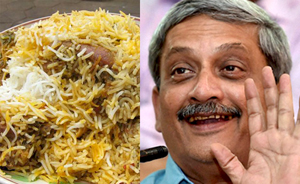Panaji, Jul 19: BJP leader and Goa Chief Minister Manohar Parrikar’s claim that the state would never be short of beef, has landed him the soup. A senior leader of Vishwa Hindu Parishad (VHP) has asked him whether BJP has become the Beef Joy Party. On the other hand the Opposition have slammed the brazen double standard of the saffron party.
NCP’s Nawab Malik, CPI (M)’s Sitaram Yechuri and Congress’ Rajeev Shukla said that the if the BJP approved Parriakar’s statements, then the party was indulging in a dangerous double game, as gau rakshaks, claiming to be members of the party, have been assaulting those they suspect of carrying beef..
“Manohar Parkiar's comments show the BJP has a special set of rules for its party members. The fact that Goa's CM said that there will be no shortage of beef in the state, and that beef will be imported from Karnataka shows how the party’s true colours,” he said.
Sitaram Yechuri of the CPI (M) echoed Malik’s statement, saying that it was a case of double-standards shown by the party. “While gau rakshaks create havoc in the rest of the country, the Goa CM proudly proclaims that there will be no shortage of beef in the state. I wonder how the BJP feels about his statement,” he added.
Parrikar on Tuesday said the state-run abattoir here produces around 2,000 kgs of beef per day and the additional demand for it is met by supplies from neighbouring Karnataka.
Addressing the state assembly on the first day of the monsoon session, Parrikar, in reply to a BJP member's concern over the quality of beef supplied from the neighbouring state, said the beef purchased from Karnataka would be subjected to proper inspection. "Approximately 2,000 kgs beef is produced per day at the state abattoir of the Goa Meat Complex Limited, while rest of beef is brought in from Karnataka. "The estimated sale of beef, based on the meat inspection charges paid by beef dealers/traders is approximately 2,300 - 2,400 kgs/day," said Parrikar, who also holds the animal husbandry portfolio.
“On one hand, the BJP assaults Dalits and Muslims, and on the other, the Goa CM says that there won't be a shortage of beef in the state for its citizens. It's quite the double speak on part of the party,” Rajeev Shukla of the Congress said.
While the party high command has not reacted to Parrikar’s statement, the VHP has called for the Goa Chief Minister’s resignation. “Has the BJP become the Beef Joy Party? Parrikar should resign for his comments,” VHP leader Dr Surendra Jain said in a series of tweets.






Comments
Good decision go ahead,we are with you
There are similarities between US and India like:-
Intolerance towards certain community
Favoring Super rich.
Hate speeches.
Self boasting.
Both love Israel cause common enemy.
But, lot of differences like:-
For us beef is god, for US beef is food.
We have Gou Rakshaks, US has Gou bakshaks.
For us only one national flag, for US each state have it's own flag besides national flag.
We buy weapons, US sells weapons.
We are just trying to get into wars, whereas US is always in war since 200 years.
Add new comment